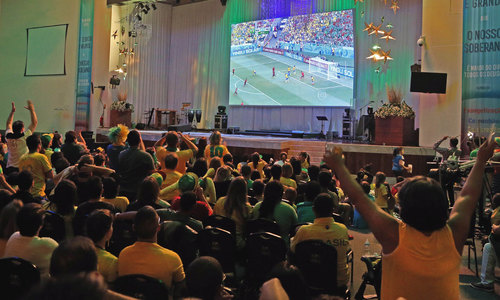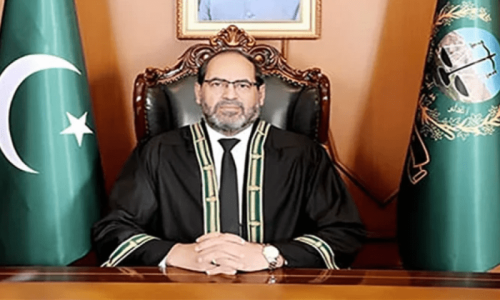MOSCOW: Ultra-nationalist and schooled in their country's historical grievances, Russian soccer hooligans see themselves as fighting the Kremlin's geopolitical battles in miniature when they clash with foreign fans at the Euro 2016 tournament.
“Our fans in Marseille are a copy of Russian foreign policy,” Professor Sergei Medvedev from Moscow's Higher School of Economics, wrote on social media after Saturday's clashes around the England-Russia game in the French city of Marseille.
Describing the mentality of the Russian hooligans, he said: “'We won't win the championship but let's at least put on a brave face, beat some people up, and have the whole world talking about us'.” Not subject to the kind of travel bans imposed on English fans who have committed violence, Russian hooligans are free to travel if they have enough money and can get a Schengen visa giving them access to much of Europe.
Read: England tell fans to behave, Russia tell their's to 'Keep it up!'
They represent a strand of nationalism which has become more strident since Moscow annexed Crimea from Ukraine in 2014 and state media ratcheted up its narrative that the West is enemy number one. Their conduct in Marseille drew praise in some political circles where sport is seen as an extension of what the Kremlin casts as Russia's battle for influence on the world stage.
“I don't see anything terrible about fans fighting,” Igor Lebedev, a nationalist who is a deputy speaker in the lower house of parliament and a member of the Russian Football Union's executive committee, wrote on social media on Monday.
“On the contrary our guys were great. Keep it up!” French authorities said about 150 hard-core Russian fans took part in the violence in Marseille. Marseille's chief prosecutor said some of the Russians involved in the worst of the violence had been trained to fight.

European soccer's governing body, UEFA, has threatened to expel the Russian and English teams from the championship if the violence persists.
The Russian authorities, already embroiled in a sports doping scandal before the Rio Olympics, have appealed to fans not to do anything to endanger the country's ability to host the World Cup soccer finals in 2018.
HOOLIGAN 'FIRMS'
The Russian hooligans, who often refer to themselves as 'ultras', belong to an organised tradition of hooliganism which has its roots mainly around clubs in Moscow and St Petersburg. They belong to “firms” modelled on what they view as the 1970s heyday of English soccer fans' thuggery.
After Saturday's clashes, some posted photos of themselves on social media holding stolen English supporters' flags upside down — some spotted with blood — as trophies.
“So-called 'active fans' have their own European championships,” said Komsomolskaya Pravda, a tabloid newspaper. “And in the alternative Euros the Russian team's fans are the clear favourites and will try to prove their supremacy.”

Many are tattooed with nationalist and Orthodox Christian slogans. Some have links to white supremacist far-right groups and, at matches in Russia, have unfurled Nazi flags and taunted black players by throwing banana skins on to the pitch and making monkey sounds.
Although Russian authorities have banned the worst offenders from domestic stadiums, high-level political criticism of their behaviour has been rare.
Russian soccer fan sites were on Monday awash with praise for what they portrayed as a famous victory over soft English soccer hooligans in France.
“The complete victory of our hard core in Marseille,” was how Spartak Moscow's Fratria fan club described the clashes, linking to a video of the violence.
“The stupid (Anglo-) Saxons,” wrote a fan nicknamed Red Bear (RedMedved). “They saw 'barbaric' Russia face-to-face and all their courage evaporated and they ran away.” Some people saw the violence as part of Russia's geopolitical standoff with the West.
“Take my word for it. This is purely our symbolic reply to your sanctions and interference in our internal affairs in Ukraine,” Valentin Polyakov, from the city of Rostov-on-Don, said of the Marseille violence on Komsomolskaya Pravda's site.

His view reflects Russian frustration — fuelled by state media — over Western sanctions on Russia over Moscow's role in Ukraine, where Ukrainian government forces and pro-Russian separatists are locked in a low-level conflict.
Russians supporters complained of what they called English “provocations” including rude songs about Russian tennis player Maria Sharapova, suspended after testing positive for a banned substance, and Russian President Vladimir Putin.
Some state media reported how 250 Russian fans had managed to get the better of more than 1,000 England supporters.
Russian fans have a history of violence, including a rampage in Moscow in which cars were overturned and two people were killed after Japan beat their team in the 2002 World Cup.
They also rioted near the Kremlin in 2010 after a Spartak Moscow fan was shot dead in a fight with men from Russia's mainly Muslim North Caucasus area, brawling with riot police and attacking dark-skinned passers-by.
Trouble flared again at the Euro 2012 tournament hosted by Poland and Ukraine when Russian fans fought with Polish supporters and hurled racist abuse at a black player.

















































Dear visitor, the comments section is undergoing an overhaul and will return soon.